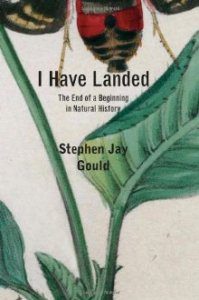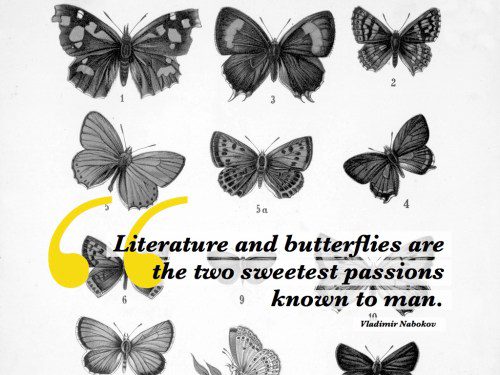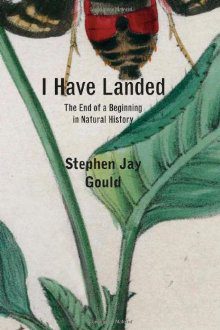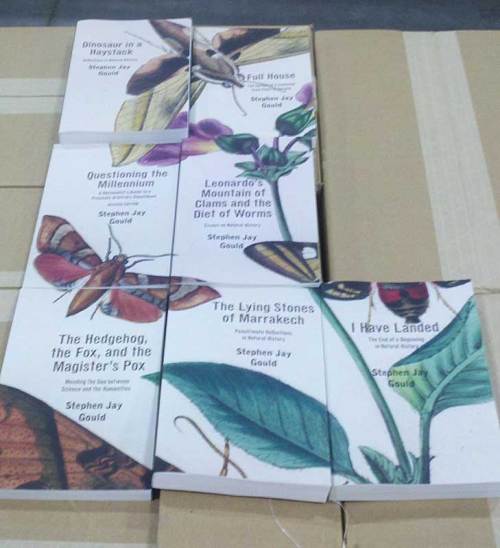 For 27 years, iconic evolutionary biologist and science historian Stephen Jay Gould contributed illuminating and absorbing essays on everything from Aristotle to zoology for the magazine Natural History, many collected in a series of anthologies, offering some of the most articulate science writing of our time and influencing public opinion on science in magnitude few other writers have achieved. This month marks the bittersweet reprint of I Have Landed: The End of a Beginning in Natural History — the tenth and final of these fantastic anthologies, featuring 31 of Gould’s essays and commemorating the centennial of his family’s arrival at Ellis Island. (The title comes from his grandfather’s diary entry on that day.) It was originally published in 2002, mere weeks after Gould passed away from cancer.
For 27 years, iconic evolutionary biologist and science historian Stephen Jay Gould contributed illuminating and absorbing essays on everything from Aristotle to zoology for the magazine Natural History, many collected in a series of anthologies, offering some of the most articulate science writing of our time and influencing public opinion on science in magnitude few other writers have achieved. This month marks the bittersweet reprint of I Have Landed: The End of a Beginning in Natural History — the tenth and final of these fantastic anthologies, featuring 31 of Gould’s essays and commemorating the centennial of his family’s arrival at Ellis Island. (The title comes from his grandfather’s diary entry on that day.) It was originally published in 2002, mere weeks after Gould passed away from cancer.
From a fascinating essay on Vladimir Nabokov’s lepidoptery poetically titled “No Science Without Fancy, No Art Without Facts” to a meditation on Freud’s evolutionary fantasy to a poignant scientific reflection on 9/11, the essays blend a head-spinning spectrum of serious scientific inquiry with the storytelling of fine fiction.

In fact, a big part of what makes Gould’s thinking so compelling and his writing so alluring is the eloquence with which he blends popular interest with deep scientific insight. (The very notion of a scientific essay faces a great deal of resistance among many scientists, who find the essay format to be inappropriate for science.) Of the balance, Gould writes:
I have come to believe, as the primary definition of these ‘popular’ essays, that the conceptual depth of technical and general writing should not differ, lest we disrespect the interest and intelligence of millions of potential readers who lack advanced technical training in science, but who remain just as fascinated as any professional, as just as well aware of the importance of science to our human and earthly existence.”
Gould closes his final essay for Natural History with this moving tribute to his grandfather, all the more profound in light of the author’s own passing shortly thereafter:
Dear Papa Joe, I have been faithful to your dream of persistence and attentive to a hope that the increments of each worthy generation may buttress the continuity of evolution. You could write those wondrous words right at the beginning of your journey, amidst all the joy and terror of inception. I dared not repeat them until I could fulfill my own childhood dream — something that once seemed so mysteriously beyond any hope of realization to an insecure little boy in a garden apartment in Queens — to
become a scientist and to make, by my own effort, even the tiniest addition to human knowledge of evolution and the history of life. But now, with my 300, so fortuitously coincident with the world’s new 1,000 and your own 100, perhaps I have finally won the right to restate your noble words and to tell you that their inspiration still lights my journey: I have landed. But I also can’t help wondering what comes next!”
Bonus: The ingenious book cover mosaic was designed by Sam Potts, whose visualization of the best of Brain Pickings 2010 you might recall.
Deeply fascinating and beautifully written, I Have Landed: The End of a Beginning in Natural History isn’t merely a precious time-capsule of one of the most important science writing voices of all time, but also a tender eulogy for the one mind that shaped so many.




